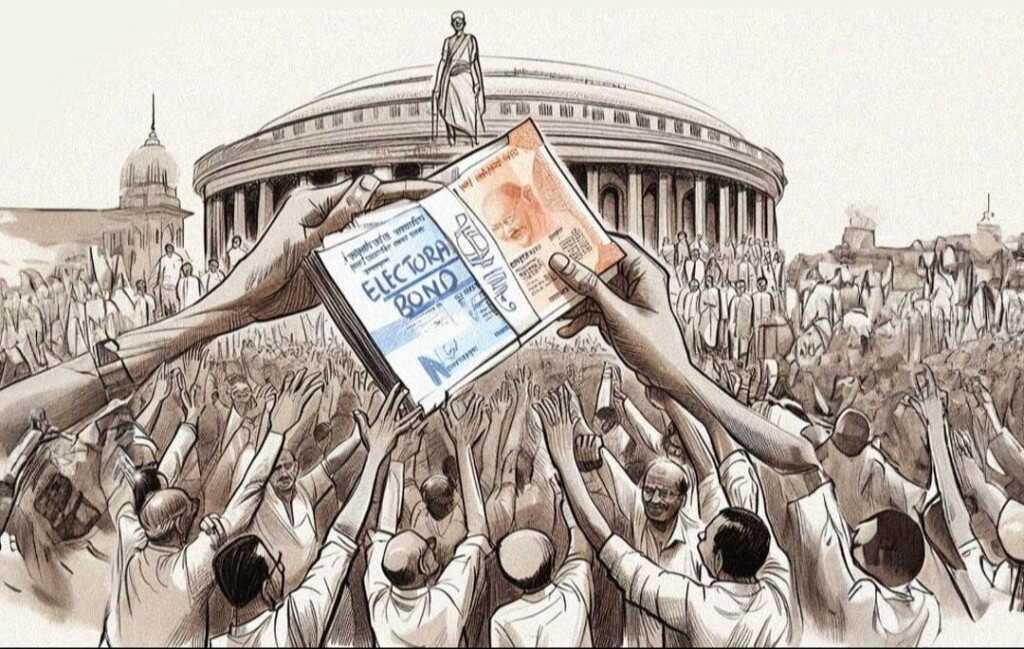In a landmark judgement, the Supreme Court on Thursday (15th February) struck down the Central Government’s Electoral Bonds scheme calling it ‘unconstitutional’ and ‘violative of Right to Information’. The court also said that this bond is capable of making the donor eligible for taking advantage or favour from any political party.
The apex court ordered the State of Bank of India (SBI) to stop issuing electoral bonds. The unanimous verdict was delivered by a five-judge Constitution bench headed by the Chief Justice of India (CJI) D Y Chandrachud along with Justices Sanjiv Khanna, BR Gavai, JB Pardiwala and Manoj Misra. Interestingly, the verdict comes months before the Lok Sabha elections in 2024.
What are electoral bonds? Why did the apex court strike it down? The CSR Journal takes a look.
What are Electoral Bonds
The Electoral Bonds scheme allowed anonymous funding to political parties. The scheme was started by the NDA Government in 2018.
The identity of the donor is kept confidential both by the bank as well as by the political party which is receiving the donation. These bonds are issued by the State Bank of India (SBI) and are sold in multiples of Rs 1,000, 10,000, 1 lakh,10 lakh, and 1 crore. The contributor could buy a bond from SBI and the bank would release it to the political party.
After the money is transferred, the recipient political party gets 15 days time period to encash it. All donations made under this scheme are anonymous and exempt of taxes. Electoral bonds, with a validity period of 15 days and yet to be encashed, would be returned by political parties or purchasers to the bank, which must refund the amount to the purchasers’ accounts.
Under this scheme, political parties which are registered under Section 29A of the Representation of the People Act, 1951 and which have received more than one per cent votes in the last Lok Sabha or state legislative assembly elections are eligible to receive electoral bonds.
How much did political parties receive through Electoral Bonds
As per reports, talking about donations received till April 2022, Rs 9,856.72 crore has been received through electoral bonds since its inception in 2017-18, with ruling party BJP alone receiving Rs 5,271.97 crore . Other parties which have received anonymous donations include Congress (Rs 952.29), Trinamool Congress (Rs 767.88 crore), the Biju Janata Dal (Rs 622 crore) and the Telangana Rashtra Samithi (Rs 383.65 crore) in the abovementioned time period.
Apex Court’s instruction to SBI regarding Electoral Bonds
The State Bank of India (SBI) has issued Electoral Bonds worth Rs 16,518 crore in 30 tranches since the beginning of the scheme in 2018.
The Supreme Court has ordered the State of Bank of India to stop issuing electoral bonds and directed the bank to submit details of bonds purchased from 12th April, 2019, till date to the Election Commission of India (ECI). The bank has been given time till 6th March, 2024 to share the information with ECI.
Why this decision
A five-judge Constitution bench headed by CJI D Y Chandrachud has declared Electoral Bonds as ‘unconstitutional’.
The Court said the scheme violates the constitutional right to freedom of speech and expression as well as the right to information. The scheme violates the voters’ Right to Information about political funding under Article 19(1)(a) of the Constitution.
“This is violative of the principle of free and fair elections and political equality captured in a value of ‘one person, one vote’,” stated Chief Justice Chandrachud.
Scheme empowered corporates
The scheme allowed inflow of huge contributions by business conglomerates, top corporate companies and multinational corporations with major business stakes in the country to political parties. The scheme and the amendments authorised “unrestrained influence of corporates in the electoral process” said the court. The Apex Court has said anonymity about the source of political funding through electoral bonds can promote corruption and a culture of quid pro quo with the ruling party to introduce a policy change or for getting a licence.


